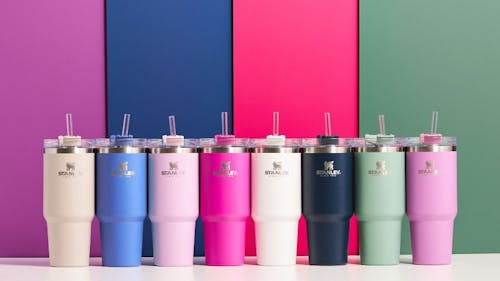What's in your water: WaterTok causes health-related controversy

Content warning: This article contains mentions of or references to disordered eating habits.
Banana bread. Cotton candy. Birthday cake. If you had to take a guess, what do these things sound like? Ice cream flavors, dessert options, candle scents?
While those are all good guesses, the real answer might surprise you. These are just a few of the new flavors that people on TikTok are adding to their water.
This summer, water is the trending drink on TikTok. Creators have been posting videos showing off their "water recipes" — a trend that has been dubbed "WaterTok" by some.
But WaterTok is receiving quite a bit of backlash from many others online. These water recipes are typically made with flavoring packets or sugar-free syrups, with each creator often having an entire Lazy Susan worth of syrup bottles to choose from and plenty of Stanley Cups to pour them in.
It's led many critics to question whether it's even fair to still call these drinks water. Some have even expressed health concerns about WaterTok, such as the fact that aspartame and other artificial sweeteners are ingredients in many of the drink mixes and sugar-free syrups. Is it misleading and potentially dangerous to describe something filled with so many artificial chemicals as just plain-old water?
But as many online controversies tend to be, this topic is more nuanced than it seems on the surface. Some WaterTok creators have pointed out that they started making these flavored waters after having gastric surgery, a procedure that requires you to drink a certain amount of water per day while recovering.
After a procedure such as gastric bypass, normal water can cause a phenomenon known as water nausea. Certain health organizations even recommend flavored water as a way to get the proper amount of fluids while avoiding pain and discomfort.
But the idea of "skinny syrups" and low-calorie water recipes as a replacement for other drinks can definitely contribute to diet culture, which is another concern some viewers of these videos have.
Because a lot of the WaterTok content is tagged with #weightloss, there's concern that water influencer content may encourage disordered eating behaviors in those already struggling with eating. Just because these waters have flavors like birthday cake and banana bread doesn’t make them substitutes for real food.
Despite all of the controversies, most WaterTok creators continue making these water recipes as a way to be creative and make their daily water intake more fun or palatable. They aren't giving any explicit nutritional advice for the most part, and the aim of the videos seems to be to create a community for those involved rather than to add a sense of pressure for people to lose weight faster or to replace food with water.
While the nutritional concerns about these drinks are valid and worth listening to, I don’t get the sense that WaterTok creators intend to imbue unhealthy habits onto their audiences.
At the end of the day, WaterTok has its positives and negatives. While it likely encourages some people to drink more water, it still might not be the healthiest option for every person.
But the criticism these recipes have received can be exaggerated, especially if some of these online creators are making flavored waters to avoid water nausea or other medical-related issues. And leaving comments meant to mock and shame these creators is not the best way to express concerns about the potential health impacts of flavored waters.
This trend won’t be in the spotlight forever. In fact, while WaterTok is still around, the trend cycle has moved on for the most part. But if you decide to try out these WaterTok recipes for yourself, it’s important to remember that it isn't a substitute for food and may not necessarily be the best substitute for drinking plain water.
The most important thing is that you do your own research on the ingredients found in sugar-free syrups and flavorings and make an informed decision on whether you think it'll be an appropriate addition to your diet. Just be responsible with the kind of messages you're sending to others.



